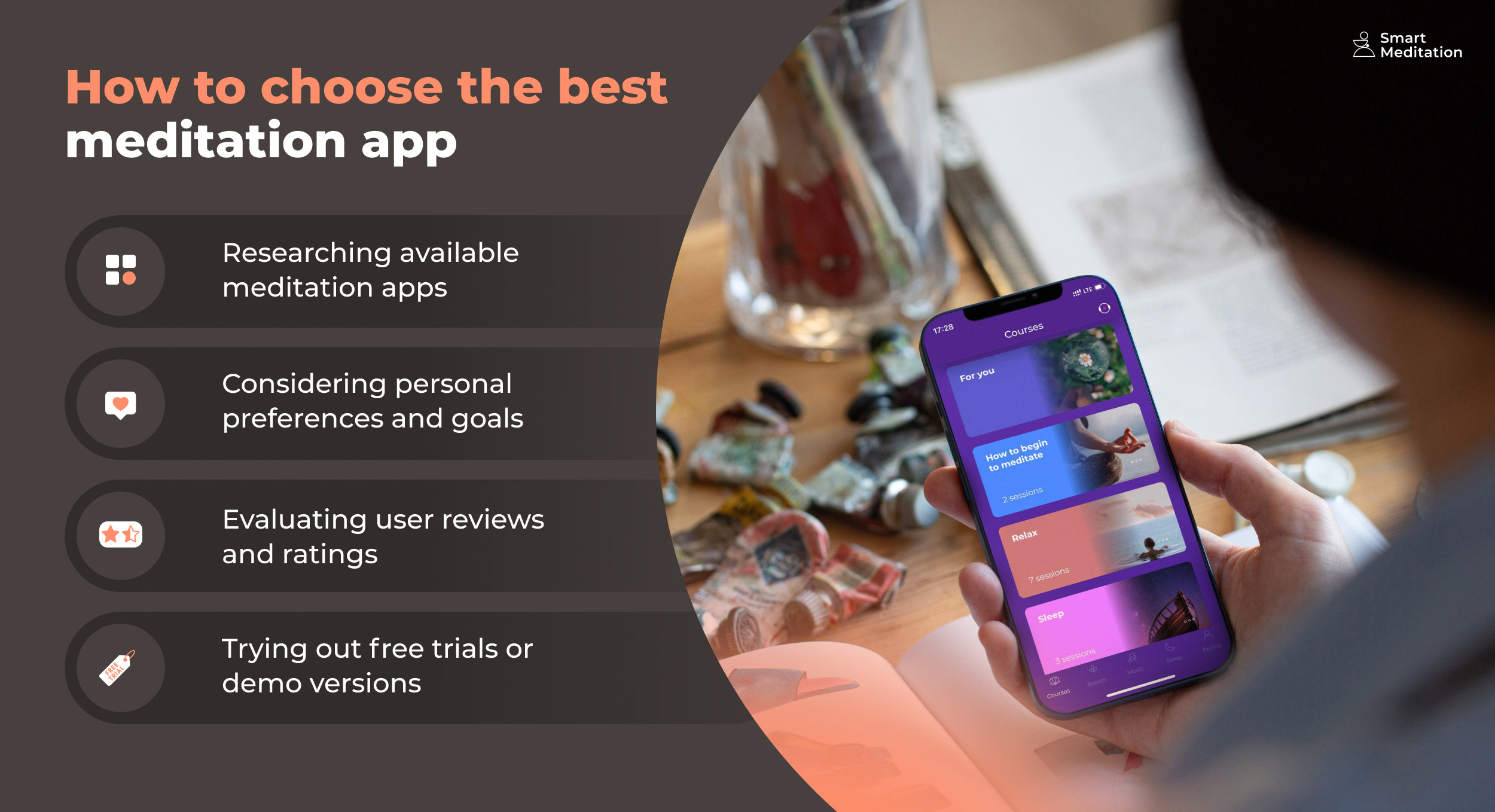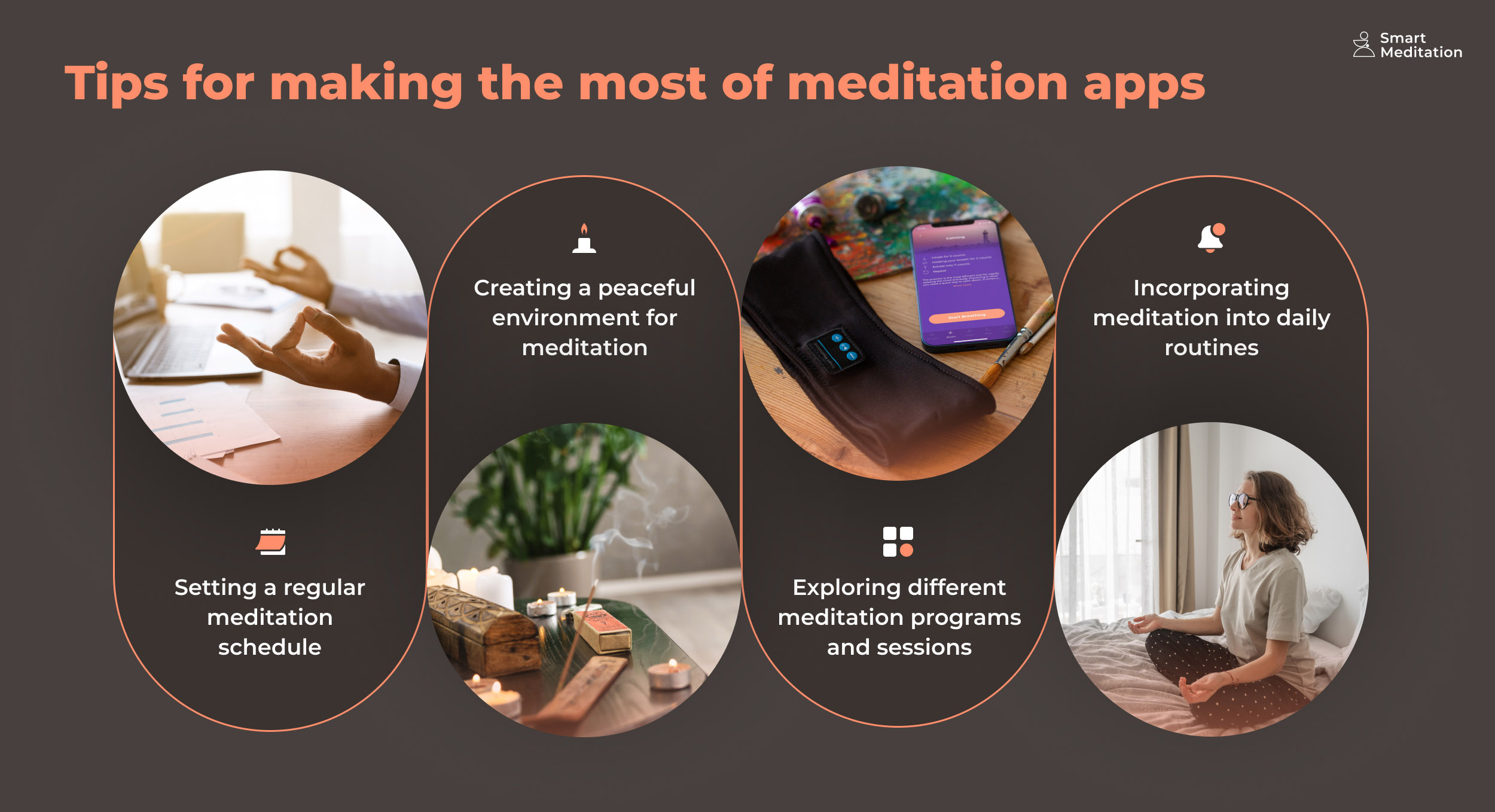
Find Your Zen: A Comprehensive Guide on Using Meditation Apps
Meditation apps have lately seen a major growth in popularity with both beginners and seasoned practitioners alike. And while you don’t require an app to meditate, it certainly adds a whole other dimension to the practice.
But what exactly does an app do? What benefits does it bring? How to choose the best meditation app? In this article, we’ll answer all of these questions and more – this is our guide on meditation apps.
Understanding the Benefits of Meditation Apps
The user base of meditation apps has been steadily growing in the last couple of years, and for a good reason. Meditation apps offer a wide variety of courses that are excellent for both beginners and experienced practitioners alike. Those courses include cognitive-behavioral techniques to develop positive thinking and relieve stress, for instance, affirmation exercises.
That, combined with the use of relaxing audiovisual stimuli and features to help you stay consistent like reminders and journaling, makes for a very beneficial tool.
At the same time, there has been a fair amount of skepticism directed towards meditation apps, claiming that they’re not scientifically backed and that they’re barely anything more than a selection of calming sounds. However, we have completely debunked this hypothesis in one of our previous articles on the science behind meditation apps. At the very least, app-powered meditation is believed to decrease anxiety levels and improve focus even better than meditation without the app.
One of the often overlooked benefits of meditation apps is that they tend to offer a great deal of customizability to make sure that you’re getting the most of your practice. That’s usually done through personalized program suggestions and other features such as reminders. The main problem, though, is that it can be very difficult to choose the perfect app – and we’re going to help with that in the next section.
How to Choose the Best Meditation App
If you’re not sure how to choose the best meditation app for yourself, we recommend following these simple steps:
Researching available meditation apps
When looking through many options available in the app stores, take note of features that appeal to you. Those could include attributes like a user-friendly interface, a wide variety of guided meditations, or the ability to customize your sessions. At the same time, make sure to acknowledge any limitations the app has or where it simply might not live up to your expectations. A few examples are a lack of complex features such as journaling, challenging navigation, or a limited selection of meditation techniques. Once you’ve done that,you can start evaluating applications side by side and eliminating subpar products.
Considering personal preferences and goals
Next, think of what exactly you’re trying to achieve with meditation – are you attempting to reduce your stress, improve your focus, sleep better, or all at the same time? There are many various types of meditation practices, and some are better than others when dealing with a specific issue. For instance, for good sleep you may want to choose an app that has good bedtime meditations, or for lowering stress, go with the one that has high quality guided breathing exercises.
Also decide for yourself how much time a day you’re ready to spend on meditation – the best apps provide flexible sessions options, ranging from just a few minutes to an hour.
Evaluating user reviews and ratings
When narrowing down your options further, read reviews and user testimonials to learn about the app’s worth. Pay attention to feedback on the app’s usability, efficiency and overall value for money. But, like we said in our meditation app selection guide, remember that everyone’s experience with meditation is unique, so what works for one person may not work for another. Therefore, do use reviews as a reference when choosing the best anxiety meditation app, but ultimately trust your own judgment and intuition.
Trying out free trials or demo versions
You can make your final choice after using the demo versions or free trials – many applications offer those so that users can test out the features before deciding to subscribe. For instance, you can test our Smart Meditation app’s 7-day free trial and make a decision after that. Pay attention to how well it performs, how easy it is to use, how well the guided meditations are made, and any other features that you deem important.

Tips for Making the Most of Meditation Apps
Meditation apps benefits are plentiful, and this is what you can do to maximize them:
Setting a regular meditation schedule
It’s easy to lose motivation and abandon the meditation practice altogether without a proper timetable. It keeps you disciplined and adds an extra bit of healthy responsibility, which tends to strengthen our dedication to the practice. Set your app to send you reminders during the day, and remember that “regular” doesn’t necessarily mean “daily” – you can still stay consistent even if you plan your sessions every other day. Also don’t forget to add an element of flexibility to your timetable, leaving more than one potential time slot for meditation on any given day.
Creating a peaceful environment for meditation
Just like good timing, a good place is also a very important factor in staying consistent. Find yourself a quiet area that is free from distracting objects such as electronic devices or hobby-related items such as books, board games, etc. Once you’ve done that, make sure that this area feels both comfortable and special – feel free to decorate it with plants, candles as well as your favorite personal belongings. Also don’t forget to keep your private meditation corner up, as a cluttered, dirty space is very detrimental to the experience.
Exploring different meditation programs and sessions
There are many great meditation courses available in apps, and some will work for you better than others. We’ve already mentioned in our article about building consistency with meditation apps that beginner practitioners often get discouraged after trying out only one technique which they didn’t like. Don’t hesitate to experiment with a variety of exercises – if you’re looking for a pure tranquil experience, you may want to focus on simple mindfulness, whereas if you want to improve your concentration, you’ll likely benefit more from body scans or mantras.
Incorporating meditation into daily routines
Finally, it’s crucial to make an effort to use the ideas and techniques you learn while meditating in your daily activities. Learn to be more conscious of your surroundings and how you feel when eating, walking, and performing daily tasks. Also at times during the day you might want to stop whatever you’re doing, take a few deep breaths, and spend a few seconds concentrating on the here and now. And a meditation app’s role in that is reminding you to practice brief mindfulness at specific periods.

Conclusion
Meditation apps are scientifically proven to, at the very least, enhance such effects of the practice as reduced anxiety and improved focus. And although it may seem challenging to pick an app that is the best fit for you personally, the process will go much smoother if you pay closer attention to user reviews, make a comparison list of pros and cons, and, finally, try out some demo versions available. And once you’ve chosen the best one, use it for setting up a meditation schedule, experimenting with various meditation techniques and integrating the practice into your daily routine.






